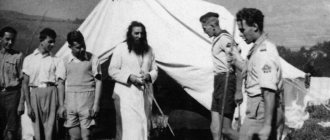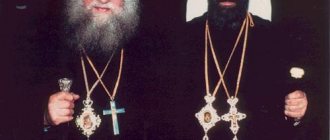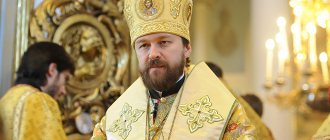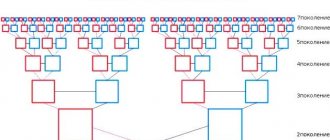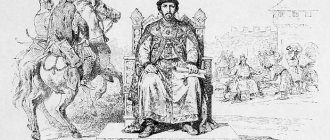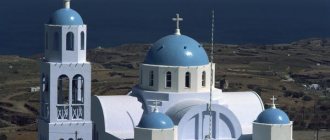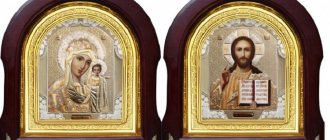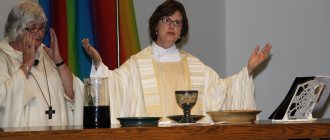| Metropolitan Anthony (Pakanich) of Boryspil |
Anthony (Pakanich)
(born 1967), Metropolitan of Boryspil and Brovary, manager of the affairs of the Ukrainian Orthodox Church, permanent member of the Holy Synod of the UOC, member of the presidium and chairman of the Commission on issues of parish life and parish practice of the Inter-Council presence of the Russian Orthodox Church, member of the Commission on spiritual issues education and religious enlightenment of the Inter-Council presence in the world Pakanich Ivan Ivanovich, was born on August 25, 1967 in the village of Chumalevo, Tyachiv district, Transcarpathian region, into a peasant family.
In 1982 he graduated from the Chumalevskaya eight-year school, and in 1984 from the Dragovskaya secondary school. In 1981-1985, he served as the senior subdeacon of the Mukachevo bishops Savva and Damascene.
From 1985 to 1987 he served in the USSR army.
From 1988 to 1992 he studied at the Moscow Theological Seminary, and in 1995 he graduated from the Moscow Theological Academy. At this time, he bore the obedience of the subdeacon of the academy's rectors, Archbishop Alexander (Timofeev) and Bishop Philaret (Karagodin). For scientific work on the topic “ The Epistle of the Holy Apostle Paul to the Romans in Russian Biblical Studies”
“Received the academic degree of candidate of theology and remained as a teacher.
On January 4, 1994, he was tonsured a monk by the rector of the Moscow Theological Academy, Bishop Filaret (Karagodin) of Dmitrov, with a name in honor of St. Anthony of Pechersk.
On February 18 of the same year, he was ordained to the rank of deacon by Patriarch Alexy II of Moscow and All Rus'.
On October 7 of the same year, he was ordained to the rank of hieromonk by Bishop Philaret.
From June 14 to August 31, 1995, he was an assistant inspector at the Moscow Theological Academy, and from September 1 to December 31, 1995, he was the academy’s secretary-referent. From January 1, 1996 to September 9, 2002 - assistant to the rector of the Moscow Academy for representative work and head of the Church and Archaeological Office.
On Easter 1999 he was elevated to the rank of abbot by Patriarch Alexy II.
| Bishop Anthony (Pakanich) |
On September 9, 2002, according to the submitted petition, he was sent to Ukraine, where he joined the brethren of the Kiev-Pechersk Lavra, and on October 26 of the same year he was appointed head of the Information and Educational Center of the Lavra.
On May 11, 2003, he became the head of the office of the Kyiv Metropolis.
On March 14, 2004, he was elevated to the rank of archimandrite by Metropolitan Vladimir of Kyiv.
In October 2005, he took part in the work of the third World Public Forum “Dialogue of Civilizations”, held on the island of Rhodes.
By the decision of the Holy Synod of the Ukrainian Orthodox Church on November 22, 2006, he was appointed Bishop of Boryspil, Vicar of the Kyiv Metropolis. His naming took place on November 25, and his consecration on November 26, 2006 in the Refectory Church of the Kiev Pechersk Lavra. Hirotony was performed by the Metropolitans of Kiev and All Ukraine, Vladimir, Chernovetsky and Bukovinsky Onufry, Archbishops Ternopol and Kremenets, Lviv and Galitsky Augustine, Kherson and Tauride John, Vyshgorodsky Pavel, Pereyaslav-Khmelnitsky Mitrofan, Poltava and Kremenchutsky Filip, bishops of the Zhitomir and Novgorod-Volynovsky and Vovgorod-Volynovsky and Vovgorod-Volynovsky and Vovgorod-Volynovsky and Vovgorod-Vovgorod-Volynsky Guri , Belotserkovsky and Boguslavsky Seraphim, Chernigovsky and Nezhinsky Ambrose, Vasilkovsky Luka and Svyatogorsky Arseny.
On May 31, 2007, he was appointed rector of the Kyiv Theological Seminary and Academy. By the decision of the Synod of the Ukrainian Church on December 14 of the same year, a united Theological-Canonical Commission of the Ukrainian Orthodox Church was created, the leadership of which was also entrusted to Bishop Anthony, retaining his previous positions.
At the Bishops' Council of the Ukrainian Orthodox Church on December 21, 2007 in the Kiev Pechersk Lavra, as chairman of the Canonical and Theological Commission, he headed the working group to prepare changes to the current Charter of the Church. By Decree of the President of Ukraine dated March 24, 2008 No. 256/2008, he was included in the organizing committee for preparing the celebration of the 1020th anniversary of the Baptism of Kievan Rus. By Decree of the Cabinet of Ministers of Ukraine dated April 23, 2008 No. 419, it was included in the supervisory board of the national Kiev-Pechersk Historical and Cultural Reserve.
By a Synodal decision of May 8, 2008, he was relieved of heading the Theological and Canonical Commission, and instead was appointed Chairman of the Educational Committee of the Synod [1]
| Archbishop Anthony (Pakanich) |
On September 24, 2008, he was elevated to the rank of archbishop.
Participant of the Local Council of the Russian Orthodox Church on January 27–29, 2009.
On May 27 of the same year he was included in the commission for the formation of the Inter-Council Presence.
On July 9, 2009, he was re-appointed chairman of the Theological-Canonical Commission at the Synod and included in the Synodal Commission of the Ukrainian Orthodox Church for dialogue with the “Ukrainian Autocephalous Orthodox Church” and the working group for preparing a dialogue with representatives of the “Kyiv Patriarchate”.
On July 27 of the same year he became a member and prasidium of the Inter-Council Presence of the Russian Orthodox Church. From January 29, 2010 to October 23, 2014 - co-chairman of the Commission on Spiritual Education and Religious Enlightenment, and from October 23, 2014 - Chairman of the Commission on Parish Life and Parish Practice, member of the Commission on Spiritual Education and Religious Enlightenment of the Inter-Council Presence [2 ].
He took part in a meeting of the rectors of theological schools in 2008 and on November 13, 2009 in the Moscow Cathedral of Christ the Savior, chaired by Patriarch Kirill of Moscow and All Rus'.
On December 23, 2010, he was released from the chairmanship of the Synodal Theological and Canonical Commission of the UOC.
On February 21, 2012, he was appointed chairman of the Department for External Church Relations of the UOC.
On May 8, 2012, he was appointed first vicar of the Kyiv Metropolis, manager of the affairs of the UOC and a permanent member of the Holy Synod of the UOC ex officio, with the dismissal of the chairman of the Department for External Church Relations of the UOC [3].
On July 20, 2012, he was relieved of his post as Chairman of the Educational Committee of the UOC [4].
On January 19, 2013, he was elevated to the rank of metropolitan by the Primate of the Ukrainian Orthodox Church, Metropolitan Vladimir (Sabodan) [5].
On September 25, 2013, he was appointed ruling bishop of the newly formed Boryspil and Brovary diocese [6].
On December 21, 2022, he was released from the rectorship of the Kyiv theological schools with gratitude for many years of fruitful work [7].
Awards
Church:
- Order of St. Nestor the Chronicler, 1st degree (2007, Ukrainian Orthodox Church)
- Order of Equals Mary Magdalene 2nd degree (Polish Orthodox Church)
- Order of St. Peter's Mogila (2012, Ukrainian Orthodox Church) [8]
- order of saints Kirill of Turovsky 1st degree (2012, Belarusian Orthodox Church) [9]
Secular:
- Order of Merit, 3rd class (2008, Ukraine) [10]
- Order of Friendship (July 11, 2013, Russian Federation, for great contribution to the development of friendly relations between peoples and strengthening of spiritual traditions) [11]
- Order of Merit, 2nd class (2013, Ukraine) [12]
Proceedings
Scientific
- The Epistle of the Holy Apostle Paul to the Romans in Russian Biblical Studies
(PhD thesis). - The Epistle of the Holy Apostle Paul to the Romans in Russian biblical scholarship with separate excursions into Western biblical studies
.
Publications and interviews
- ““Theological Academy on the Banks of the Dnieper” - Interview with Bishop Anthony (Pakanich) of Boryspil, rector of the Kiev Theological Academy and Seminary,” Meeting
No. 1 (26), 2008. - ““Not just a museum, but a continuation of the temple” - Interview with the head of the Church-Archaeological Office, Abbot Anthony (Pakanich),” Meeting
, No. 3 (13), 2000. - “Answers to questions from Archimandrite Anthony (Pakanich),” Pechersky Blagovestnik
, No. 1-2, 2004. - “Answers to questions from Archimandrite Anthony (Pakanich),” Pechersky Blagovestnik
, No. 1, 2005. - ““No one is self-sufficient in the Church” - answers to questions from Archimandrite Anthony (Pakanich),” Pechersk Evangelist
, No. 2, 2005. - “Holiness is the thorny path of this life” - answers to questions from Archimandrite Anthony (Pakanich),” Pechersky Blagovestnik
, No. 3, 2005. - “Answers to questions from Archimandrite Anthony (Pakanich),” Pechersky Blagovestnik
, No. 4, 2005. - “Answers to questions from Bishop Anthony (Pakanich),” Pechersk Evangelist
, No. 1, 2007. - ““Spiritual work unites God and people” - answers to questions from Bishop Anthony (Pakanich),” Pechersky Evangelist
, No. 2, 2007. - ““We are on the cob path” - an interview with the Rector of KDAiS, Bishop Anthony of Boryspil,” Pechersky Blagovestnik
, No. 2, 2007. - “The Betrayal of Judas Iscariot”, Ukraine Orthodox
, May 2006. - "Your apocalypse for every day." Interview,” Mirror of the Week
, newspaper, No. 27 (656) July 14 - 20, 2007. - “Changes to the Charter should reflect the current state of the UOC,” Church Newspaper
, No. 25 (201), December 2007. - Web conference of His Grace Anthony, Bishop of Boryspil, December 2007:
- “Current conditions and prospects for spiritual education in Ukraine,” speech at the 2008 Council of Bishops.
- “Games of religion lead to mental disorders,” Orthodoxy in Ukraine
, November 2008. - “Orthodoxy is a religion of joy,” dialogue between the rector of the Kiev Theological Academy and Seminary, Archbishop Anthony of Boryspil and the deputy head of the State Administration of the President of Ukraine Rostislav Lyubomirovich Valikhnovsky, Information Agency InterMedia Consulting
, April 2009. - “Priests and doctors cannot be taught in absentia,” Thomas
, October 2009. - “Razdilennya is an unnatural camp for the Church”:
- “There is no need to wait for radical changes...”, Orthodoxy in Ukraine
, September 9, 2009: - Interview “St. Demetrius personified a new galaxy of theologians open to culture...”, Religion in Ukraine
, November 10, 2009: - “Local Churches and Church Unity. A few words about church autocephaly”, Proceedings of the Kiev Theological Academy
, No. 8, 2008. - “The attitude of the Orthodox to the “semantic” translation of the Bible,” Proceedings of the Kiev Theological Academy
, No. 9, 2008. - “Prospects for the development of spiritual enlightenment in Ukraine”, Proceedings of the Kiev Theological Academy
, No. 9, 2008. - “Orthodox testimony to the crisis of current marriage”, Proceedings of the Kiev Theological Academy
, No. 10, 2009. - “The reason and purpose of writing the Epistle of the Apostle Paul to the Romans,” Proceedings of the Kiev Theological Academy
, No. 10, 2009. - ““With a feeling of fraternal unity,” interview with His Eminence Anthony, Archbishop of Boryspil, rector of the Kiev Theological Academy and Seminary,” Russian Monk
, February 2009. - “Interview with Bishop Anthony of Borispol, rector of the KDAiS, chairman of the Theological Commission of the Ukrainian Orthodox Church: “Changes in the charter should reflect the current state of the UOC,” Church Newspaper
, No. 25 (201), December 2007. - “Web conference of His Eminence Anthony, Bishop of Boryspil Rector of the Kiev Theological Academy and Seminary “In the Theological School, all issues are resolved individually, there are no universal methods,” “ Orthodox Newspaper
, No. 4 (206), 2008. - ““Priesthood is a self-imposed service to God and people, sometimes service even to the point of self-sacrifice” - interview with the rector of the KDAiS, Archbishop Anthony of Boryspil,” website of the Belotserkov diocese, April 22, 2009.
- “Be like a soldier in the church”, magazine Ukraine
, No. 3, 2009.
Reports
- “Patristic foundations of the sacrament of Priesthood”, V International Theological Conference of the Russian Orthodox Church Orthodox Teaching on Church Sacraments
, Moscow, November 13-16, 2007. - “Historiosophy “Words about Law and Grace””, VIII international Assumption readings Memory and history: at the crossroads of cultures
, Kiev, September 29, 2008. - “Orthodoxy and MODERNITY – A MEETING OF DISCOURSES”, international scientific and practical conference ORTHODOXY AND MODERNITY: AN EXPERIENCE OF A MEETING
(to the 100th anniversary of the Kiev Religious and Philosophical Society and the collection “Milestones”), May 1, 2009.
Orthodox Life
Realist
In January, Realist wrote about the inevitability of conflicts around church property after the creation of the Orthodox Church of Ukraine (OCU) and the granting of a tomos to it by the Patriarchate of Constantinople. Three months later, the forecasts begin to come true. In the last two weeks, between the first and second rounds of voting for the president, conflicts with physical violence, seizures of churches of the UOC-MP (hereinafter referred to simply as the UOC, since the UOC-KP merged with the OCU) by supporters of the OCU, with the assistance of local authorities, engulfed the Rivne region. At the same time, in the center, too, the Kyiv District Administrative Court declared the law on renaming the UOC illegal. And today the Constitutional Court accepted this law for consideration. The UOC made a loud statement about the need to revoke the tomos. In response, the head of the OCU, Metropolitan Epifaniy, assured that the tomos was not in danger and that his church was recognized by other local churches. He also reiterated that transitions should take place “without coercion, based on love.” But the UOC considers the seizure of their churches as persecution of their parishioners. They are not going to change the name and still do not recognize the new OCU.
Realist spoke with the head of the affairs of the UOC, Metropolitan Anthony (Pakanich) of Boryspil and Brovary, about all this, as well as how the situation in the church sphere could change if the country’s president changes. The editors are also ready to provide an equal platform for statements to representatives of the OCU.
— How many churches of the UOC were transferred to the newly created OCU? What is the situation with the Kyiv-Pechersk and Pochaev Lavras?
— According to our statistics, 68 religious communities transferred from the Ukrainian Orthodox Church to the organization created by Constantinople, and another 78 churches were seized by force. The Holy Dormition Kiev-Pechersk and Holy Dormition Pochaev Lavras remain in our church. By law, all buildings of historical significance belong to the state, and we use them. It cannot be ruled out that the state, represented by the Ministry of Culture, will want to terminate the use agreement.
— How does the Ministry of Culture react to your refusal to rename, since according to the new law the deadline for this is already running out?
— The deadline expires on April 26 — symbolically, this year it coincides with Good Friday. The Ministry of Culture sent an official reminder of this to our dioceses, monasteries and synodal institutions. Representatives of the Ministry of Culture say that if we do not change our name, they will do it for us. We are not going to change the name and we are defending our right in the courts. This requirement violates all kinds of national laws and European conventions. But we are not very worried about this. Our church already lived without registration after the 1917 revolution until World War II. Oppression, persecution - no matter how strange it may sound, have been natural for Christians since the very beginning of Christianity. Trials are sent to us to become more courageous. And we will survive! The power of God is stronger than any ruler of this world. As the proverb says: in the marriage of the Church and the state, the widow is always the Church. What does the government achieve in this way? Does he want to force our parishioners into basements to pray? Is this the European way?
— In property conflicts, in the same Rivne region. OCU communities are registered by order of the head of the Regional State Administration. How are the powers of the state and church divided here?
— The question is not even about the boundaries of authority, but about compliance with the law, including by government officials. According to the law, the decision to change subordination is made by two thirds of the church community. In fact, re-registration occurs either secretly without the knowledge of the parishioners who own the temple, or village residents are gathered to make a decision on changing the ownership of the temple. But not everyone in the village is a parishioner of the temple: there are atheists or parishioners of other faiths.
The invaders come with documents according to which we are no longer on the state register, and a community of a new religious structure appears with our details. A raider scheme is being applied to us, which was widely used in the 1990s to seize enterprises and other property.
In the same Rivne region, only in the last two weeks, in this illegal way, more than 60 parishes of the so-called OCU received registration with the details of UOC communities. Unfortunately, our politicians have long been dividing people into right and wrong. Now this section is being transferred to the church sphere, without realizing that the most terrible conflicts occur on religious grounds. A person, defending his shrines, is ready to go to the last. There is a feeling that we are on the verge that this confrontation could escalate into bloodshed, when villagers turn against each other. If left unchecked, it will spread throughout the country.
- What are these feelings based on?
- On facts. April 12 in the village of Kurozvany, Rivne region. supporters of the so-called OCU first expelled our parishioners from the church, and when they began to pray in the house, they broke down the door there and threw the holy gifts into the streets. On April 13, in the same place in the Rivne region, our parishioners were beaten in the village of Kopytov. At the same time, our priest was dragged outside the church fence, pushed and kicked in the back. April 14th during Sunday service! captured the church of St. Cosma and Damian in the village of Rozvazh, Rivne region. As a parishioner of the seized church said, people were grabbed by the arms, hair, and their clothes were torn. In Vinnitsa region, in the village of Krasnoselka, at the instigation of the local authorities, they want to evict a young priest, who has two small children and a pregnant wife, from his house. This is no longer a question of property, open persecution of the church.
- And who is doing this: who are the instigators?
“It’s hard for me to call those who come to beat a priest during a service or those who violate the holy gifts for communion, the most sacred thing for every Christian, Christians. The elderly priest cries and says how can this be, because I baptized them.
- But they do this under the flag of the new OCU, and even if they don’t like your church, they also believe in Christ?
— They are captured by loudmouths: those who do not go to church, or go only on major holidays or when they need something. The leaders, of course, are radically minded people. Unfortunately, many people told us that these actions are preceded by instructions from local government administrations. But parishioners who constantly visit churches and live a religious life (practicing Christians, as we call them) do not leave our churches and, even after they have been deprived of a church, remain in their church.
— What are the response actions of your church? You personally said in September 2022 that you urge your parishioners not to provoke conflicts with their actions. What concessions are you willing to make to prevent them from escalating?
— We protect our churches within the framework of the law. We file lawsuits in court and win. This is not difficult, because the violation of the law is obvious.
We do not lead parishioners into confrontation. We proceed from the fact that one cannot defend the faith with fists and bats.
The Primate of our Church, His Beatitude Metropolitan Onuphry, at a meeting of the All-Ukrainian Council of Churches and Religious Organizations with the President, which took place on the eve of the first round of presidential elections, directly told President Poroshenko about the illegal seizures of churches of the Ukrainian Orthodox Church and that people tell us that this is happening due to direct instructions to regional state administrations from Bankova. To which Pyotr Alekseevich assured that no instructions had been received either from his administration or from the regional state administrations. Nevertheless, this is exactly what happens, because you can’t hide an awl in a bag.
— Have you addressed this question to the OCU, since this is being done under their flag?
— His Beatitude Metropolitan Onuphry spoke about this in the presence of all the heads of churches, including the new structure created by Constantinople. They remained silent. It is surprising to me that they do not notice such actions of their supporters, and perhaps this is happening with their knowledge. In an interview, one of the leaders of the so-called OCU stated that they will do everything to ensure that their church spreads throughout Ukraine. I would not like to think that this “everything” includes violent raider seizures of our churches. But people will not go to such a church.
- Where such confidence?
- From the history. At the beginning of the 20th century, the Bolshevik atheists also created a new renovationist church for themselves and transferred churches to it. But people didn't wear them. While still studying at the seminary, I learned why the Cathedral of Christ the Savior in Moscow was so easily blown up. After the Soviet government gave it to the renovationists, it was empty and there was no one to protect it. What's the end result? As a result, the priests who converted to renovationism were first used, and when this pseudo-church structure became unprofitable for the authorities, they faced the same fate as the clergy of the genuine Church: arrests and executions. Today only we - priests and, probably, historians - know about this, and renovationism has sunk into oblivion. We need to know history and not repeat mistakes. By the way, then the Patriarchate of Constantinople also supported renovationism and convinced His Holiness Patriarch Tikhon (he restored the Moscow Patriarchate in November 1917, anathematized the Bolshevik government for violence and was under house arrest for many years. He officially died of heart failure, but there is a version of poisoning - R⁰) renounce the patriarchate, as they said then, for the sake of peace.
— If the UOC refuses to unite, then what do you think the state should do?
— If a new church structure has been created, then why aren’t churches built for it? Why don’t the authorities and those who don’t like our church help finance the religious structure they created, but take away the churches built by our communities?
Moreover, through some kind of cheating: secret re-registration and informal instructions for the seizure of our churches. What will those who expel and beat people pray for in our captured churches? How can representatives of the so-called OCU, after all the lawlessness committed, preach love for neighbors? This is either some kind of wildest spiritual blindness, or banal hypocrisy. Let the OCU supporters think about this. In Christianity there is only one sign of faith - love. When violence is committed against one's neighbor in the name of God, I will say in the words of St. John the Theologian: “If you do not love your neighbor, whom you see, how can you love God, Whom you do not see?” Unfortunately, in history more than once some kind of mass madness has engulfed people. On Sunday, April 21, the feast of the Lord’s entry into Jerusalem, when people, expecting that Christ would lead them to fight for the independence of the Jewish state, shouted: “Hosanna, Hosanna to the son of David!” A few days will pass - they will already be shouting: “Crucify Him!” It’s one thing to read about this in the Gospel, but when you see the same thing in our lives, you are convinced with your own eyes of the truth of Holy Scripture. Today, due to the strong influence of the media, it is quite easy to drive people into madness.
It is important that every person settle down: no good deed can be done in passion!
—You don’t see a demand in society for a single local Orthodox Church?
— Of course, we are for unification: any sensible and loving people understands that the division of the Orthodox is not natural. The Ukrainian Orthodox Church has been saying since the 1990s that the schism is a dead end. But the unification should take place on the basis of the canons of the church, and not in favor of political or even national ideas. Christianity calls to break out of earthly laws. I really like the saying that we are citizens of Heaven with earthly residence. How is a priest different from a politician? A good politician thinks what will happen in a year, a very good one - in ten years. But even an ordinary priest thinks about eternity. The Church differs from any ideology in that it transfers the perspective of eternity to life here and now. In this case, you need to follow the canons. There is no other way but for the schismatics to return to the true Church. Then it will be a real and viable association.
— You always insist on canonicity. Why are the canons so important for ordinary believers?
— The word canon means norm, that is, law. Society cannot live without norms and laws. The canons are based on Holy Scripture and are formed from the spiritual experience of church life.
We are so sensitive to them because many generations of genuine Christians have suffered through them. Canons are like guiding signs that help you not to derail on the spiritual path. This is the foundation of the Church. Destroy the foundation and the entire structure collapses.
— What if parishioners of other Orthodox churches do not like the “boss” in the person of the Russian Orthodox Church with its “Russian World”?
“At the same time, they submitted to another “boss” on more unfavorable terms. I mean the Patriarchate of Constantinople. If we compare the charter of the UOC and the document that appears as a charter for the new structure (I don’t know how reliable it is, because I haven’t seen the original with a seal: again, everything is covered in fog), then our status is a self-governing church with broad autonomy within the Moscow patriarchy gives us an order of magnitude more independence than their position in relation to Constantinople. In addition, your question contains too much politics and so-called platitudes or ideological cliches that do not correspond to reality. For example, the Russian Orthodox Church does not justify the war in Donbass. There are no such statements.
— Your opponents claim that your autonomy is not recorded anywhere, and the head of the UOC is not commemorated by other Orthodox churches at services...
— Autonomous status is the internal status of the church. Only the heads of autocephalous churches are commemorated. The charter of Patriarch Alexy of Moscow from 1990 directly states that the Ukrainian Orthodox Church has been granted the rights of independence with the rights of broad autonomy. The point is not in form, but in content, that is, to what extent the status of the church allows it to fulfill its mission. We have much higher independence than some autocephalous churches. We do not agree with anyone on candidates for Primate or candidates for bishops.
— Were there any precedents when the Moscow Patriarchate did not agree with the candidacy of the Primate of the UOC? Or is it pre-agreed with them?
— As a hierarch and in my ministry as manager of the affairs of the Ukrainian Orthodox Church, I answer with full responsibility: there have never been any instructions from Moscow on what decisions to make. There were no agreements. We make decisions on our own, and not once have there been any reproaches or comments from there that we made the wrong decision.
— Our sources said that representatives of the Russian Orthodox Church were present at the meeting of bishops of the UOC and influenced the decisions...
“I’ll say it very harshly: this is a lie.” Our meetings are publicly publicized with photographs. Nowhere will you see at a meeting of the Holy Synod a single representative of either the Russian Orthodox Church or other churches. Nowadays many fakes are being launched against our church. For example, when information began to appear about our priests’ refusal to perform funeral services for ATO soldiers, we began to check. Not a single such case has been confirmed. If the deceased was baptized not in the UOC, but by schismatic structures, then we do not have the right to perform the rituals. This should be done by ministers of those religious organizations in which he was a parishioner. But there were other cases when government officials indicated to the relatives of the deceased that the funeral service should be performed by a priest of the “Kyiv Patriarchate”. And the media wrote that our priest allegedly refused. The relatives of the deceased did not dare to refuse the authorities, and then asked our priest to go to the grave for a real funeral service. Not that in the villages, there was such a case in Kyiv. The same fakes were launched about the alleged separatist weapons depots in our monasteries. As soon as such information appeared, we began to check and called the abbots of those monasteries. We invited the SBU and the Ministry of Internal Affairs to come and seize them if they find weapons there. They came, checked and apologized. But no one gave a refutation to the press. And we don’t trumpet about what we do. These fakes created a negative attitude towards us among those who do not attend church regularly and do not know church life.
— It is known that President Poroshenko was your parishioner. Do you know if he is visiting the UOC now?
- Don't know. I know from the press that where he lives there is a small church. Previously, one of the priests of the Ionin Monastery went there to serve. Now from official information we see that on Christmas and Easter the president visits churches of all faiths. I was there last year for Easter: I prayed for a long time with my family.
— Is there a reaction from Constantinople to the call of the UOC to revoke the tomos?
— This was not a separate appeal to the Ecumenical Patriarch Bartholomew. The Synod of the Ukrainian Orthodox Church summed up the first results of the granting of the tomos to schismatic organizations that united into the so-called OCU. We highlighted them in an open statement addressed to all Local Orthodox Churches. It says that the tomos did not lead to unity, but on the contrary increased contradictions. There were three structures, and with the tomos a fourth appeared.
- How about four? After all, the UOC-KP, led by Patriarch Filaret, and the UAOC, led by Metropolitan Macarius, merged with the OCU, which means they self-destructed.
— The most interesting thing is that there are no legal documents on the liquidation of the “Kyiv Patriarchate”. Moreover, why are only our captured or transferred churches re-registered under the new structure of the OCU, why is this not done with the churches of the “Kyiv Patriarchate” and the UAOC?
— They automatically came under the OCU...
— Then why are they still legally registered with the previous structures?
- The general public is not aware of this...
“The point is that there is a lot of deception in all of this.” Moreover, at first, immediately after receiving the tomos, those of our churches that voluntarily left the UOC changed their legal registration not to “OCU”, but to “Kiev Patriarchate”. But our lawyers did not see the document on the re-registration of the “Kyiv Patriarchate” to the “OCU”. And according to our information, no one is going to do this in the future.
- Why is that so, in your opinion?
“I think because in this artificial institution they don’t trust each other.” According to our information, in most churches of the “UAOC” (Ukrainian Autocephalous Orthodox Church - ed.) neither Epiphanius is commemorated at services, nor even their Macarius is commemorated, but only Patriarch Bartholomew.
— The Primate of the OCU, Metropolitan Epifaniy, publicly stated that recognition of his church is underway...
- He named it, who else recognized it, besides Phanar?
- No.
- Deception again. And this church structure was also created on deception. I emphasize that not a single Local Autocephalous Church recognizes the OCU. On the contrary, there are statements that in the future they are not going to recognize this structure in the form it is today. We constantly communicate with other Local Orthodox Churches, and they share the pain of our church. The Antiochian, Serbian, Polish, Cypriot, Albanian, Church of the Czech Lands and Slovakia believe that the Ukrainian problem is so serious that it needs to be solved conciliarly - by the Council Reason of the entire Ecumenical Orthodoxy. Most recently, on April 18, in the Archdiocese of Cyprus, the situation in Orthodoxy was discussed by the primates of the four oldest Orthodox Churches - Patriarch Theodore of Alexandria, Patriarch John of Antioch, Patriarch Theophilus of Jerusalem and Archbishop Chrysostomos of Cyprus. Of course, we also touched upon the situation in Ukraine after the provision of the tomos to the new structure of the OCU. They appealed to all parties to protect the temples from capture, no matter what the reasons.
- What do you mean as it is?
— Let’s take at least the head of the new structure. He is now called “Metropolitan of Kyiv and All Ukraine.” But according to the canons, and Metropolitan Savva of Warsaw and All Poland officially speaks about this in his statement, this man does not even have holy orders, because Philaret ordained him while in schism. For many years, Ecumenical Patriarch Bartholomew also considered both the “Kiev Patriarchate” and the UAOC schismatic structures. Until 2022, all his official statements clearly indicate that in Ukraine he recognizes only one Orthodox Church - our Ukrainian Orthodox Church, which was previously headed by Metropolitan Vladimir, now by Metropolitan Onufry.
— Were there any precedents for revoking the tomos?
— Patriarch Bartholomew himself revoked the document on the transfer of the Kyiv Metropolis to the Moscow Patriarchate, signed 300 years ago by Patriarch Dosifei of Constantinople. Another example closer to our days. On November 27, 2022, the Synod of the Patriarchate of Constantinople revoked the patriarchal tomos for the Archdiocese of Russian parishes in Western Europe, which it had granted in 1999. And in Ukraine, in order not to incite internal hostility between people and so as not to cause a schism in Ecumenical Orthodoxy, this must be done. How exactly? It needs to be discussed. Do not isolate yourself in your position, but gather together in a fraternal atmosphere in the awareness of responsibility before God, before the Orthodox world and history, and find a way out. There are hasty and thoughtless decisions, but there is always an opportunity to correct it in order to avoid more severe consequences.
— What expectations does the UOC associate with the likely change of head of state?
“We expect one thing from the presidential elections - the government will begin to act within the legal framework, and violation of the law and violation of human rights, including freedom of religion, will be suppressed in every possible way.
The personality of the next president is not important to us. Whoever it becomes, it is important for us that relations between the state and the church are within the framework of the Constitution and relevant laws, so that there are no more situations, like in the Rivne region, when government officials did not side with the law.
Personalities change, and there is no need to adapt laws to the individual. Understand, we are not supporters of Ukraine turning from a secular state into a religious state. A secular state means a clear separation of powers between church and state and mutual respect. We are ready to be partners of the state in what unites Ukrainians, and the authorities cannot solve many problems without the church.
—Parishioners ask who to vote for?
— I answer, vote according to your conscience. But judge a man by his deeds.
— Orthodox Easter is in a week. What would you wish to the Orthodox of Ukraine on the eve of this bright holiday?
— On the eve of the main Christian holiday and the most important event in the life of mankind, it is important to remember that God loved us so much that he came into the world in order to be crucified.
Divine love is poured out on everyone - both on those who recognize God and those who do not. I would like to wish everyone to feel His love and, most importantly, try to share it at least a little with each other.
These are not formal words. The Christian life is learned through experience. In our difficult situation both in the state and in Ukrainian Orthodoxy, it is important to show the world that we are Christians not in words, but in deeds. We may not share any beliefs, but it is important to show that we strive to be worthy children of God, followers and helpers of Christ. Let me remind you once again: this can only be done through love - for your neighbors, and therefore for Christ.
